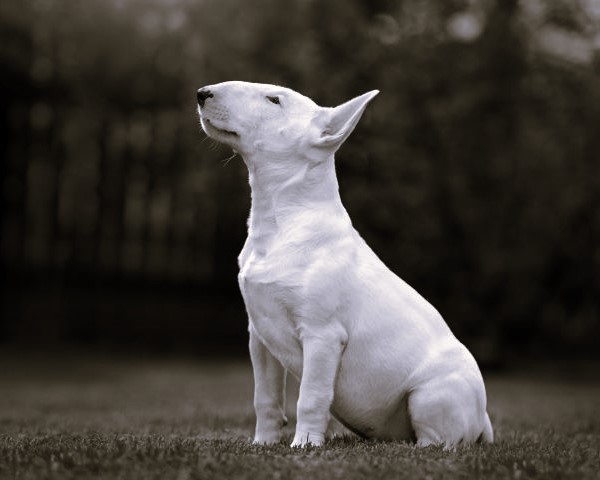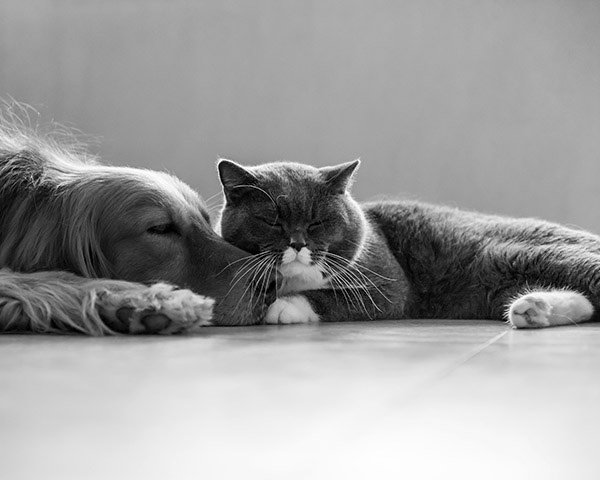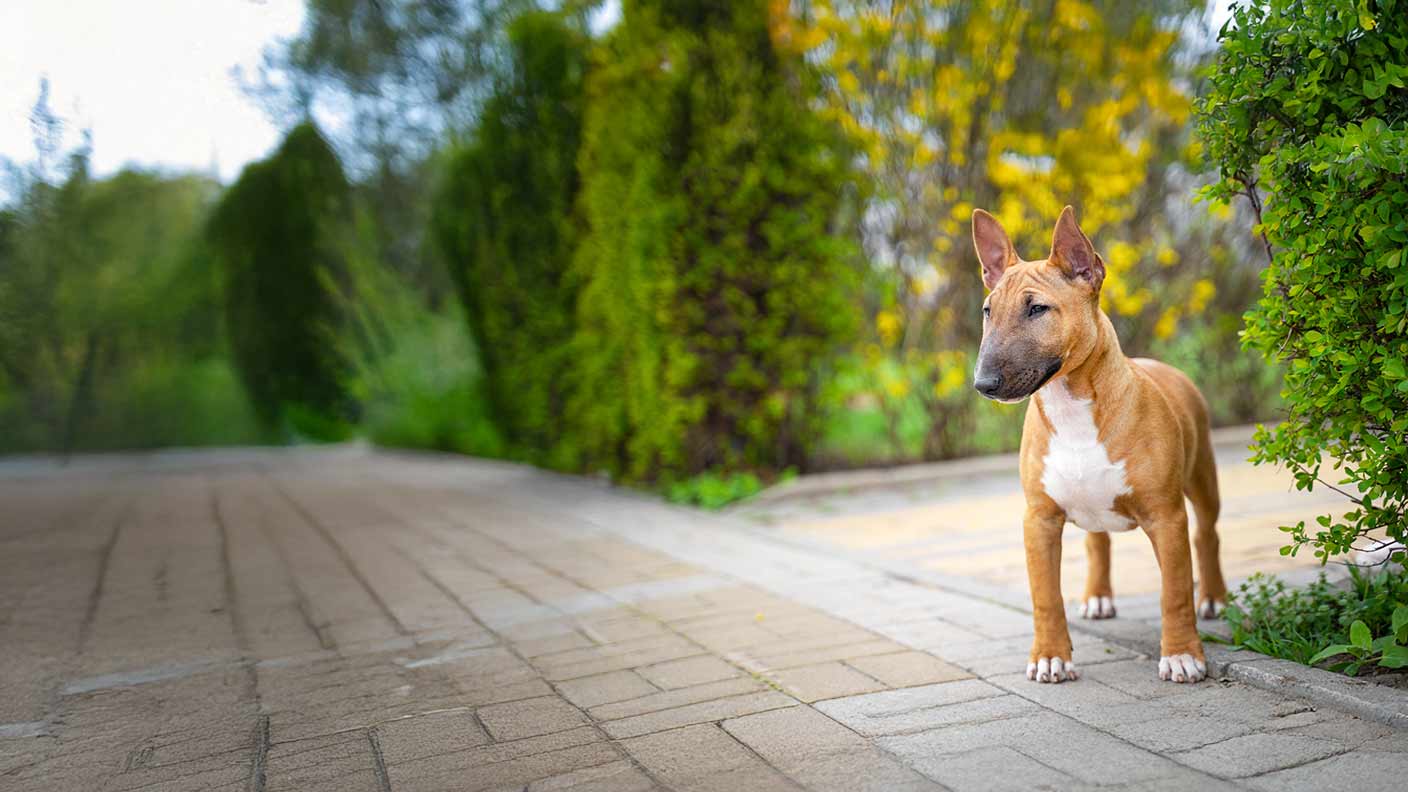Bull Terrier dog breed information and advice
You’ll often find this dog with their unmistakably long head, and small, triangular ears, muzzle-deep in mischief. Bull Terriers are powerful and playful, with little eyes that shine bright with joy and humour. These muscular mutts thrive off attention, making them welcoming companions.
Bull Terriers are full of love and energy, but they can be a bit stubborn, so you’ll need to have patience. But, with a bit of firm training and a lot of love they can become staunch and loving members of the family in no time.
Bull Terrier facts

| Lifespan | 10 to 15 years |
| How much | £400 - £1,000 |
| Size | 80 - 98 cm |
| Weight | 20 - 36+ kg |
| Colours | White, brown, red, black, patterned |
| Grooming | Once a week |
| Temperament | Mischievous, humorous, loving |
| Exercise | One hour per day |
Pet insurance for your Bull Terrier
Bull Terriers are active, playful and mischievous, meaning they end up getting their paws into all sorts of situations. Pet insurance for your Bull Terrier can keep them covered from their puppy days into old age.
While Bull Terriers are healthy dogs, there are some common conditions with the burly breed, including:
Sainsbury’s Bank Pet Insurance for Bull Terriers
If you’re looking to protect your pooch, Sainsbury’s Bank Pet Insurance can cover your Bull Terrier from eight weeks old.
There are three types of cover you can get with Sainsbury’s Bank Pet Insurance:
- Lifetime – lifetime pet insurance is our most comprehensive cover, letting you manage pet bills with up to £10,000 toward vet bills each year.
- Maximum benefit – get pet insurance that covers your dog for illnesses, accidents and conditions up to £6,000.
- Time limited – covers your dog with vet costs for short-term health conditions of up to £3,000, or for 12 months.
Please note, we won't cover any pre-existing conditions. Terms, conditions, excesses, exclusions and limitations apply.
How to care for a Bull Terrier
As with any medium to large-sized dog, Bull Terriers require a good diet, plenty of play, and a touch of grooming to keep their tail wagging. Give them the love and attention they deserve, with our care guide.
Feeding and nutrition
Your dog’s feeding and nutrition can vary depending on their age, weight, activity level, intolerances, lifestyle and health. That means not every dog is the same, even among the same breeds. Try your best to avoid feeding your Bull Terrier fatty foods as a puppy, as the breed is quick to gain weight.
Grooming
These loveable pups don’t require much maintenance at all when it comes to grooming. Their short, glossy coat is as easy to maintain with a weekly brush. It’s a good idea to inspect your Bull Terrier’s pointy ears often for signs of infection, too.
Exercise
With a Bull Terrier, get ready for playtime, all the time – the Bull Terrier brings high energy and playful spirit wherever it goes. That means without mental stimulation to keep them entertained, they’ll be running circles around you and your home. Give your Bull Terrier plenty of attention though, and they’ll give it all back.
Training
Your Bull Terrier may have an inclination for mischief (and a stubborn streak to boot). Bull Terriers can be a challenging breed to train, but like all dogs, starting training while they’re as young as possible can work wonders. On the plus side, you’ve got a high energy dog who’ll welcome anyone with open paws. They love being part of the family but may require a lot of attention and a gentle yet assertive training manner from their owners.
Temperament and behaviour
Bull Terriers are known for being strong-willed, high energy, and happy-go-lucky. They’re loyal, but their stubborn nature, mischievous personality, and playful energy can make them difficult to train. If not given enough attention and stimulation, these positive traits could turn into destructive energy.
Daily exercise is a must, with enough room for them to play when they get bursts of energy. If you can’t give attention to your pup, or you don’t want a dog with high levels of attachment, a Bull Terrier might not be the right breed for you. If you do though, they’re a playful companion that’ll always stand by your side.
Common health problems
While Bull Terriers are generally a healthy breed, you should regularly visit the vet as there are some common issues a professional should look out for. Remember, pet insurance cover for conditions before they appear is important, as pre-existing conditions may not be included in a new policy.
Learn more about common health problems in Bull Terriers:
Atopy
Around 10-15% of dogs can suffer from atopy, and the Bull Terrier breed is no exception. Atopy means your dog could suffer from genetic skin allergies, and there’s a lot of allergens, including:
- Dust mites
- Pollen
- Dander
- Proteins
In many ways, it’s like the doggy version of eczema. If your dog suffers with atopy, they’ll experience regular skin conditions. It’s a lifelong disease, so comfort is essential. Grooming, medicines, and diet are ways that can help to manage the disease.
Patella luxation
Patella Luxation (or a luxating patella) is a condition referring to your dog’s patella, the dog’s kneecap, that sits in the knee joint. This orthopaedic condition occurs when the patella shifts, causing a mobility issues – something that any breed, but especially Terriers, won’t enjoy.
Dogs can be born with a luxating patella or develop the condition over time due to genetic factors. Unfortunately, Bull Terriers are one of the breeds with a hereditary predisposition to luxating patella.
Common signs that your pup might be suffering from Patella Luxation include:
- Limping
- Holding their leg up, stretching it out behind, or taking weight off it
- Difficulty with walking
- Pain around the knee area
Depending on the severity of the symptoms, different treatments could be available. Mild cases may just need management and awareness, whereas severely luxating patella may require surgery.
Lethal Acrodermatitis
Lethal Acrodermatitis is an inherited skin condition that can affect Bull Terriers from birth. It comes with a list of serious symptoms, including:
- Skin lesions on the paws and face
- Bronchopneumonia (a subtype of pneumonia)
- Diarrhoea
In most instances, puppies with Lethal Acrodermatitis die before two years of age. They also grow significantly slower than other dogs.
Deafness
While all dogs can suffer from deafness, it’s quite common in Bull Terriers. As it can be a hereditary condition, nearly 18% of Bull Terriers suffer from deafness at birth. Your dog should still be able to go about their daily lives, but you may need some extra considerations when interacting with them.
So, is a Bull Terrier right for you?
Looking for an active dog that’s as playful as you are? Bull Terriers may be strong-willed and stubborn, but they’re fiercely loyal, endlessly active, and lovers of human company.
Frequently asked questions
Is a Bull Terrier a good family dog?
Yes, the Bull Terrier can be a brilliant breed to bring home to your family. But they will need adequate and early training, as well as supervision. While they’re loyal and playful, they may not always be able to read a situation. If you have young children, you should be extra cautious. Bull Terriers are often not recommended for first time owners as they can be stubborn to train.
How long do Bull Terriers live?
Bull Terriers live about 10-15 years on average, assuming a normal, healthy life. While there are a few common conditions, Bull Terriers are generally a healthy breed.
Do Bull Terriers bark a lot?
YWhile Bull Terriers aren’t known for their barking, they can be a bit of a whiny breeds. Expect them communicate in whimpers and growls, rather than sharp barks.
Are Bull Terriers considered an aggressive breed?
No, Bull Terriers are not considered an aggressive breed, but there has been a stigma in the past. In fact, they’re incredibly friendly, welcoming, and deeply love being around people. Like all dogs, Bull Terrier aggression comes from other factors, such as neglect, frustration, poor training and mistreatment.
Bull Terriers are also an energetic breed, so may become destructive, if they are not given the mental and physical stimulation they need.

Browse our guides
Choose from our list of helpful guides and information

Explore dog breeds
Find out how to keep your dog healthy and happy

Cat breed guides
How to care for your cat, common health problems and more
Terms and conditions
Important information
* Guaranteed discount for Nectar members: The discount is based on information related to you and the transactions you've made with Sainsbury's supermarkets and Sainsbury's Bank using your Nectar card. For more information go to sainsburysbank.co.uk/nectar.
Sainsbury's Bank plc, Registered Office, 33 Charterhouse Street, London, EC1M 6HA (registered in England and Wales, no 3279730) is authorised by the Prudential Regulation Authority and regulated by the Financial Conduct Authority and the Prudential Regulation Authority (register no. 184514).
Sainsbury's Supermarkets Ltd is an appointed representative of Sainsbury's Bank plc. Sainsbury's Bank plc acts as an introducer to Pinnacle Insurance Ltd who is authorised by the Prudential Regulation Authority and regulated by the Financial Conduct Authority and the Prudential Regulation Authority (register number 110866). Registered office: 4th Floor, Limelight, Elstree Way, Borehamwood, Hertfordshire, WD6 1JH. Sainsbury’s Bank Pet Insurance is arranged, administered and underwritten by Pinnacle Insurance Ltd. Sainsbury's Bank plc and Pinnacle Insurance Ltd are not part of the same corporate group.
We do not provide personal recommendations to customers.
